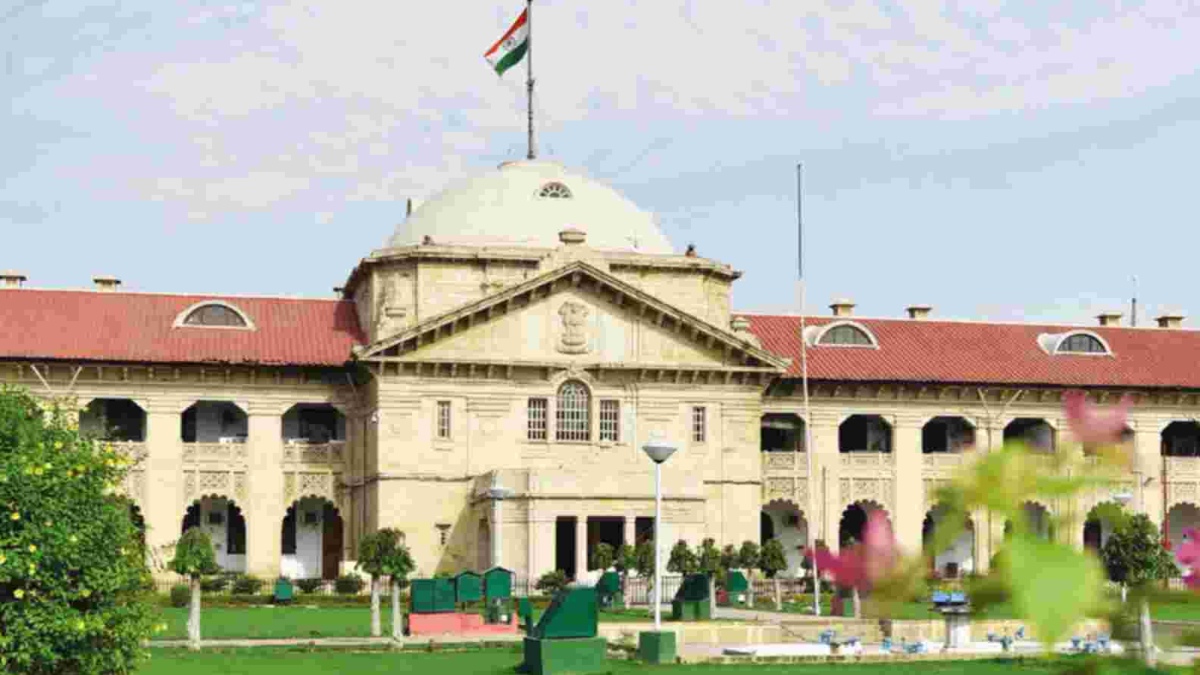
While dispelling all misgivings and question marks raise over whether Section 482 CrPC plea is maintainable or not to quash proceedings which are ex facie bad for want of sanction, the Allahabad High Court has in a learned, laudable, landmark and latest judgment titled Mahendra Pal Singh Lekhpal And Another v. State of U.P. and Another in Application U/S 482 No. – 15266 of 2007 delivered as recently as on January 10, 2022 observed that an application under Section 482 CrPC is maintainable to quash the proceedings, which are ex facie bad for want of sanction as required under Section 197 of CrPC (Prosecution of Judges and public servants). In holding so, the Bench of Justice Chandra Kumar Rai has set aside a summoning order passed by the Judicial Magistrate Farrukhabad against a Lekhpal (applicant number 1) and a Kanoongo (applicant number 2) in the Consolidation department (both public servants) without obtaining necessary sanction as provided under Section 197 of CrPC. Very rightly so!
To start with, this noteworthy judgment authored by a single Judge Bench of Justice Chandra Kumar Rai sets the ball rolling by first and foremost observing in para 1 that, “The instant application under Section 482 Cr.P.C. has been filed to quash the summoning order dated 14.03.for demarcation.2007 passed by Judicial Magistrate IIIrd, Room No.12 Farrukhabad in complaint case No.28 of 2006 (Siya Ram Vs. Mahendra Pal and others).”
While elaborating on the facts of the case, the Bench then envisages in para 2 that, “The brief facts of the case are that applicant No.1 is a Lekhpal in the Consolidation department and applicant No.2 is a Kanoongo in the Consolidation department and both are the public servants. During consolidation proceedings, a joint plot was allotted to opposite party No.2 and one Ram Singh. Opposite party No.2 filed an application on 28.08.2006 before Settlement Officer of Consolidation for making measurement of plot No. 372. The Settlement of Consolidation Officer by order dated 29.08.2006 directed the Consolidation Officer to make measurement in accordance with law.”
While continuing in the same vein, the Bench then enunciates in para 3 that, “In pursuance of the order of Settlement Officer of Consolidation dated 29.08.2006, necessary reports were submitted by Consolidation authorities and applicant Nos. 1 and 2 on 15.11.2006 conducted measurement of disputed plots with the help of local police and submitted their report before the Assistant Consolidation Officer. The report dated 15.11.2006 has been annexed as Annexure No.2 to the affidavit accompanying with the present application, in which it is mentioned that measurement has been taken place taking due care of the crop standing in the disputed plot. Opposite party No.2 filed a complaint on 27.11.2006 before the Judicial Magistrate, Farrukhabad with the allegation that applicant Nos.1 and 2 have illegally made measurements of the plot, in which crops were standing and there was an order dated 15.11.2006 to stop the measurement,2 the2 copy of the complaint has been annexed as Annexure No.3 and order dated 15.11.2006 has been annexed as Annexure No.4 to the affidavit. The Judicial Magistrate IIIrd, Room No.12, Farrukhabad by order dated 14.03.2007 summoned the applicant under Section 427 IPC, without considering the facts that applicants are public servant and they were discharging their official duties.”
As we see, the Bench then points out in para 4 that, “This case was listed on 10th July, 2007 and following order was passed on that date:
“Heard the learned counsel for the applicants and the learned A.G.A.
It is contended by the learned counsel for the applicants are the lekhpal and Kanoono respectively. They have made measurement of the land on the basis of the order passed by the C.O. concerned. They have discharged their duties and the allegations against them are false and frivolous.
Issue notice to O.P. No.2 returnable within four weeks.
In view of the facts and circumstances, further proceedings of complaint case No.28 of 2006 pending in the Court of Judicial Magistrate, III Room No.12 Farrukhabad, shall remain stayed till the next date of listing. List after four weeks”
Be it noted, the Bench then makes no bones about the irrefutable fact which it states in para 11 that, “There is no dispute about the fact that applicants are public servants and further they were discharging their official duties, as such the arguments advanced by the learned counsel for the applicants that private complaint against the public servant for want of sanction would vitiate criminal proceeding has got substance.”
Needless to say, the Bench then stipulates in para 13 that, “The object of sanction for prosecution whether under Section 197 of the code of criminal procedure is to protect a public servant discharging official duties and functions from harassment by initiation of frivolous criminal proceeding.”
While citing the relevant case law, the Bench then mentions in para 14 that, “The Hon’ble Supreme court in a case of Matajog Dubey vs. H. C. Bhari AIR 1956 SC 44 has held:
“…..Public servants have to be protected from harassment in the discharge of official duties while ordinary citizens not so engaged do not require this safeguard…………There is no question of any discrimination between one person and another in the matter of taking proceedings against a public servant for an act done or purporting to be done by thhe public servant in the discharge of his official duties. No one can take such proceedings without such sanction…..”.”
While citing yet another relevant case law, the Bench then states in para 15 that, “In Pukhraj vs. State of Rajasthan and another (1973 2 SCC 701), the Hon’ble Supreme Court has held:
“2…..While the law is well settled the difficulty really arises in applying the law to the facts of any particular case. The intention behind the section is to prevent public servants from being unnecessarily harassed. The section is not restricted only to cases of anything purported to be done in good faith, for a person, who ostensibly acts in execution of his duty still purports so to act, although he may have a dishonest intention. Nor is it confined to cases where the act, which constitutes the offence, is the official duty of the official concerned. Such an interpretation would involve a contradiction in terms, because an offence can never be an official duty. The offence should have been committed when an act is done in the execution of duty or when an act purports to be done in execution of duty. The test appears to be not that the offence is capable of being committed only by a public servant and not by anyone else, but that it is committed by a public servant in an act cone or purporting to be done in the execution of duty The section cannot be confined to only such acts as are one by a public servant directly in pursuance of his public officer, though in excess of the duty or under a mistaken belief as to the existence of such duty. Nor need the act constituting the offence be so inseparably connected with the official duty as to form part and parcel of the same transaction.
Read conclusion on www.thedaily guardian.com
What is necessary is that the offence must be in respect of an act done or purported to be done in the discharge of an official duty.
It does not apply to acts done purely in a private capacity by a public servant. Expressions such as the ‘capacity in which the act is performed’, ‘cloak of offence’ and ‘professed exercise of the office’ may not always be appropriate to describe or delimit the scope of section. An act merely because it was done negligently does not cease to be one done or purporting to be done in execution of a duty…..”.”
It is worth noting that the Bench then candidly observes in para 16 that, “Every offence committed by different officer does not attract section 197 of the Code of Criminal Procedure. The protection given under Section 197 of the Criminal Procedure Code has its’ limitation. The protection is available only when alleged act done by the public servant is reasonably connected with the discharge of his official duty, an offence committed outside the scope of the duty of the public servant would certainly not require sanction. If in doing official duty public officer if committed any mistake or has been summoned in excess of duty even then the sanction of the Government as provided under Section 197 of the Criminal Procedure Code is mandatory.”
It is quite noteworthy that the Bench then elucidates in para 18 noting that, “On the point of stage at which trial court has to examine sanction question Hon’ble Supreme Court in D.T. Virupakshappa Vs. C. Subash, AIR 2015 12 SCC 231 has held that High court had erred in not setting aside an order of trial court taking cognizance of a complaint in exercise of power under Section 482 Cr.P.C.”
More significantly, the Bench then hastens to add in para 19 holding that, “The Hon’ble Supreme Court in the case of D. Devaraja vs. Owais Sabeer Hussain reported in [2020 (113) ACC and 904] has held that if the sanction as provided under Section 197 of Criminal Procedure Code has not been taken, the order taking cognizance by the Magistrate will be illegal and the High Court should exercise the power under Section 482 Cr.P.C. to quash the proceeding which was bad for want of sanction.”
Most significantly, the Bench then minces no words to state succinctly in para 20 that, “On the basis of law laid down by Hon’ble Supreme Court as mentioned above, it is well settled that an application under Section 482 Cr.P.C. is maintainable to quash the proceedings, which are ex facie bad for want of sanction. If, on the face of complaint, the act alleged appears to have a reasonable relationship with official duty power under Section 482 Cr.P.C. would have to be exercised to quash the proceedings to prevent abuse of process of Court.”
Finally and far most significantly, the Bench then concludes by holding elegantly, eloquently and effectively in para 21 that, “In view of the facts and circumstances stated above, I am of the view that learned Magistrate has illegally taken cognizance of the offence summoning the applicants under section 427 IPC, which is ex facie bad for want of sanction. The application under Section 482 Cr.P.C. is allowed. The summoning order dated 14.03.2007 passed by the Judicial Magistrate IIIrd Room No.12 Farrukhabad in complaint case No.28 of 2006 is set aside and complaint is also quashed for want of sanction in exercise of power under Section 482 Cr.P.C. No order as to costs.”
In conclusion, this notable judgment by a single Judge Bench of Justice Chandra Kumar Rai of Allahabad High Court leaves not even an iota of doubt to make it crystal clear that Section 482 plea is maintainable to quash proceedings which are ex facie bad for want of sanction. All the courts must abide and adhere by what the Allahabad High Court has held so explicitly in this leading case and act accordingly as directed in this leading case! No denying or disputing it!















